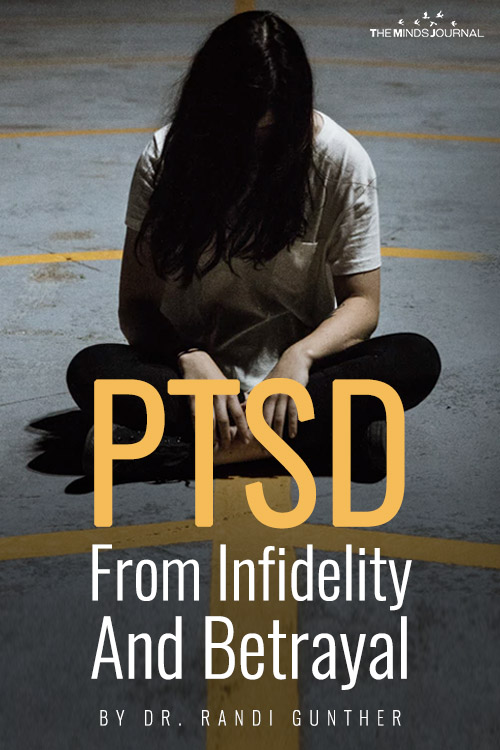The trauma left behind by infidelity has many similarities with the experience of Post Traumatic Stress Disorder or PTSD. Yes, being cheated on can make you go through the symptoms of PTSD.
Of all of the threats to a committed relationship I have treated in four decades of working with couples, the most difficult to heal is infidelity. When a trusted partner in a committed relationship betrays the sacred trust of the other, the relationship will undergo severe instability.
The partner who has been betrayed is emotionally tortured and humiliated when knowledge of the infidelity emerges. They are clearly in trauma and experience the same array of symptoms that professionals now describe as Post-Traumatic Stress Disorder.
Related: How To Know If Surviving Infidelity Without Counseling Is Possible For You
Similar to any others who have suffered threats to their physical or emotional well-being and security, they are disoriented and confused by what has happened.
Relationship partners of both genders experience similar of the classical symptoms of PTSD:
- Repeated intrusive thoughts.
- Unstable emotional regulation.
- Out of body experiences.
- Alternating between feeling numb and striking out in retaliation.
- Inability to stop scanning for any new data that might cause more distress.
- Feeling overwhelmingly powerlessness and broken.
- Needing to regain self-worth by assigning blame.
- Confusion and disorientation.
“Ever since I found out about the affair, I can’t stop thinking about what happened. I have repeated nightmares. My faith in trust and love is demolished. The person I believed in most in the world betrayed me without seeming to care. If I’d known something was wrong, maybe I could have stopped it before it got going. I spin between being devastated and being enraged. I can’t seem to find any peace, knowing that there is probably more than I will ever be told. I feel like a goddamn fool, humiliated and broken. How could my partner do this to me?”
The trauma of betrayal can also trigger memories of buried or unresolved emotional and spiritual damage from the past. When those prior traumatic experiences are triggered and re-emerge, they significantly complicate the healing process.
For there to be any chance that the couple undergoing this situation can ever transcend the distress of broken trust, they must deal with two simultaneous challenges:
- The first is to understand and work through the combination of both current and re-emerging trauma responses of the betrayed partner.
- The second is for both partners to both commit to specific roles in the healing of their mutual distress.
The 5 Most Common Re-Emerging Issues
1. History of Prior Trauma.
When people experience a life-threatening event earlier in life, they create defenses that allow them to survive those traumas. Those defenses can be either be barricades to future pain or unconscious seduction to recreate what is familiar.
If a relationship partner has been harmed by threats of loss or harm in the past, he or she will have a stronger and more persistent trauma response to a partner’s current betrayal. Dependent on how much they appear similar to what is happening in the present, they will mesh with the current pain and make recovery that much harder.
2. Emotional and physical resilience.
Whether born into a person or learned throughout life, resilience is the conqueror of prolonged sorrow. Though grief must not be denied, those who are lucky enough to be more resilient can endure it without falling prey to extended emotional heartbreak.
Resilience after a betrayal is also buoyed up by the kind of social support a person has access to. When infidelity is discovered, it is easy for traumatized partners to lose sight of their own worth. Authentic, caring, and responsive others are able to remind them of who they were before the trauma and help them to regain emotional stability.
Sadly, the most common excuse many unfaithful partners give when they stray is that they were unable to get their needs met in the relationship. Those accusations increase the anguish of the betrayed partner.
Related: What You Need To Know About Surviving Long Term Infidelity
3. The strength of the primary relationship.
When people have a strong bond, both partners openly talk about their needs and disappointments as they occur in their relationship. They know that outside temptation is always possible, but they are committed to making their relationship stronger if they arise.
If a relationship is wavering and the people within it are no longer as bonded as they once were, one or both of the partners may be searching for meaning outside the relationship. If those yearnings are not shared and the relationship goes unresolved, they are more likely to transform into actions.
Some relationships feel more okay to one partner than they do to the other. If those feelings are not shared and an affair happens, the unknowing partner has had no opportunity to intervene. They feel they are doing everything right, that their love is intact, and that trust will never be broken.
That partner is understandably more demolished when an affair emerges.
4. Double Betrayal: When the infidelity is with a known party.
Besides the experiences of humiliation and anguish, an even more destructive heartbreak occurs when the third member of the triangle is a close and trusted friend or a family member.
When the betrayed partner discovers that two deeply trusted people could collectively collude behind his or her back is almost unfathomable. In these cases, there are often others who know what is going on causing even more potential loss of relationships when the affair emerges. Those who have remained silent may then pull away for fear of being seen as accomplices.

5. How long the infidelity has been going on.
An affair that is quickly confessed along with true remorse and the desire to do whatever is necessary to help the betrayed partner heal, has the best chance of success if it never happens again.
On the other hand, a partner who finds out that the betrayal has been going on for weeks or months, or even that it is still active, is fundamentally more damaged and finds it much harder to heal. For most women, it is not just a passing affair anymore.
It is a fully developed relationship of secrecy, passion, and emotional connection, stealing love and commitment from the existing partnership. For most men, it is the sabotage of being cuckolded by another male who has taken his woman from under his eyes and sold him out as a “brother.”
The person outside of the primary relationship, who has been willing to be a co-betrayer, often feels that he or she has claimed possession of the infidel. That individual may not be willing to be dismissed and can become a deterrent to a relationship’s potential healing.
Related: Which Marriages Survive Infidelity and How To Tell If Yours Is One Of Them
Given the seriousness of these potential emerging issues and the ways they may combine, it is understandable how much influence they may have in whether or not the relationship can heal and over what period of time.
How do two people who do not want to lose their relationship navigate the process of broken trust to a possibility of reconciliation?
How does a betrayed partner ever learn to believe the other again?
How does the partner who chose to act this way get past his or her guilt and remorse?
What must happen for recovery and re-commitment to even be possible?
Once both partners understand how likely it is that a betrayed partner will evidence the symptoms of PTSD, they realize that the healing process is the same for all traumas. The betraying partner must simultaneously play the dual roles of an ally to his or her partner’s healing and a seeker of absolution from the very person they have carelessly wounded.
The other must survive the trauma and learn to love again.
The Role Of The Betraying Partner As An Ally In Healing The Trauma
Most betraying partners truly want to heal their relationship but have difficulty not blaming their other partner in some way they chose to stray. Gender responses are often different.
For instance, more men than women justify that decision by stating that their sexual needs weren’t being met, that their partners didn’t pay enough attention to them in general, or that they felt exploited in the relationship.
More women than men traditionally cite their reasons for an affair as lacking an emotional connection with their primary partner, a lack of availability in general, or inadequate romantic support.
In order to expedite healing, the betraying partner has to recognize that they must put aside anything they felt that drove them to give in to an affair until they recognize and feel remorse for the act of betrayal, itself. They are legitimately on trial for invalidating the worth of their primary relationship, succumbing to a self-serving motivation, and the willingness to risk severely wounding the other partner.
As now allies in healing the relationship, they must be prepared to encourage and weather whatever frustration, anguish, or retaliation their betrayed partner needs to express. They must be willing to stay the game for however reasonable time it may take, to put their own needs and underlying grievances aside, and to fully commit to the healing of their partner’s rage and grief. The more committed the betrayer is to the process, the sooner his or her partner will be able to heal.
Related: 5 Strategies For Surviving The Guilt Of Infidelity
The Role Of The Traumatized Partner
Feeling devastated, humiliated, and broken are hard experiences to survive. Though the traumatized partner has every reason to be upset, he or she must work through those responses in a sincere and committed way, alongside the other partner’s commitment to do whatever is mutually needed for healing.
The partner experiencing PTSD will most likely have wildly swinging mood changes, emerging experiences of underlying, unresolved issues, and agonizing waves of grief. While simultaneously feeling the need to strike back, run away, or feel immobilized, they must learn to self-soothe, create resilience, seek outside support, and commit to a renewed faith in a better future.
If, additionally, they’ve been the object of previous trauma, they must also sort out what is happening in the present from what they may have endured in the past, so as not to blame their partner’s current betrayal for something they did not cause.

Building A Future Relationship
Both partners must realize that their past relationship is over and that their goal is to build a new one that will withstand challenges in the future. When the partner who is the ally in healing merges with the partner who is ready to move on, they can create a new kind of sacred trust that can be significantly stronger by virtue of what they’ve been through together.
This process is not for those who want a quick fix, nor for those who hold fast to the past. Superficializing a true betrayal can create unresolvable pain. Similarly, carrying mistrust, anger, and pain forever will eventually destroy any hope of true healing. The betraying partner must take seriously what he or she has done. The partner who has been betrayed must truly want to rebuild the relationship and to ultimately learn to trust that person again.
Yes, I have seen partners do this kind of healing, and do it beautifully. They take the lessons from the past, learn to communicate courageously and honestly, and build something neither has known before. Their relationship like a Phoenix can emerge from the ashes of their mutual sorrow.
Written by Randi Gunther Ph.D. Originally appeared in Randi Gunther Ph.D










Leave a Reply
You must be logged in to post a comment.